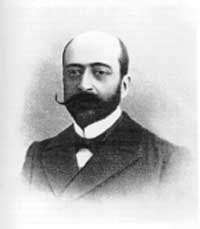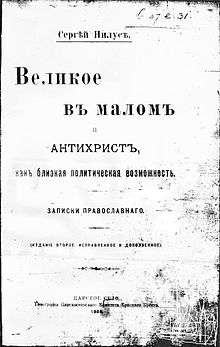Pavel Krushevan
Pavel Aleksandrovich Krushevan (Russian: Павел Александрович Крушеван; Romanian: Pavel Cruşeveanu) (27 January [O.S. 15 January] 1860 – 18 June [O.S. 5 June] 1909) was a journalist, editor, publisher and an official in Imperial Russia. He was an active Black Hundredist and was known for his far-right, ultra-nationalist and openly antisemitic views and was the first publisher of The Protocols of the Elders of Zion.[1]

| The Protocols |
|---|
 |
| First publication of The Protocols |
| Writers, editors, and publishers associated with The Protocols |
| Debunkers of The Protocols |
| Commentaries on The Protocols |
|
Biography
Born Pavolaki Krushevan into a family of impoverished Russianized Moldavian aristocrats in the village Gindeshty (now Ghindeşti, Floreşti district, Moldova) Bessarabian guberniya (село Гиндешты Сорокского уезда Бессарабской губ.), he completed four grades of school.
Krushevan served as a clerk in Chişinău City Duma. His writings were first published in 1882. In 1887–1896, he worked as a journalist in newspapers Минский листок (Minsky Listok, The Minsk Post), Виленский вестник (Vilensky Vestnik, The Vilnius News), and Бессарабский вестник (Bessarabsky Vestnik, The Bessarabia News).[2]
During the decade that followed, Krushevan founded and served as a publisher and editor of several newspapers:
- In 1897, Chişinău daily newspaper Бессарабец (Bessarabets, The Bessarabian) which published materials fomenting anti-Semitism. Krushevan was reported as being one of the initiators of the Kishinev pogrom in April 1903.[3]
- In 1903, Saint Petersburg daily newspaper Znamya, where the first (abridged) edition of The Protocols of the Elders of Zion was published in series from August 28–September 7 O.S., 1903.[4]
- In 1906, Kishinev newspaper "Друг" (Droog, The Friend).
Krushevan promoted ultra-nationalist and racist views and was brought to court numerous times for slander, verbal offenses and physical threats. After a homicidal attempt by a P. S. Dashevsky, it was reported that Krushevan lived in constant fear, kept weapons close at hand and was accompanied by a personal cook out of fear to be poisoned.
In 1903 a riot started after an incident on February 6 when a Christian Russian boy, Mikhail Rybachenko, was found murdered in the town of Dubăsari, about 25 miles north of Chişinău. Although it was clear that the boy had been killed by a relative (who was later found), Бессарабец, published by Krushevan, insinuated that he was killed by the Jews instigating the Kishinev pogrom.[5][6]
In 1905 Krushevan organized the Bessarabian Patriotic League. He founded the Bessarabian branch of the Union of the Russian People.
From 1906 to 1909 he served as a speaker of Kishinev city in the Duma. In 1907 Krushevan was elected to represent Kishinev in the 2nd Russian State Duma.
See also
- History of the Jews in Bessarabia
- History of the Jews in Russia and the Soviet Union
References
- Michelis, Cesare G. De (2004). The non-existent manuscript: a study of the Protocols of the sages of Zion. Lincoln: Univ. of Nebraska Press. pp. 76–80. ISBN 0803217277.
- Davitt, Michael (1903). Within the Pale. New York: A S Barnes. p. 97.
- Davitt, M. (1903). Within The Pale: The True Story of the Anti-Semitic Persecutions in Russia. New York: The Jewish Publication Society of America. Retrieved from http://sammlungen.ub.uni-frankfurt.de/urn/urn:nbn:de:hebis:30-180013272008
- Cesare G. De Michelis, Richard Newhouse. The non-existent manuscript: a study of the Protocols of the sages of Zion. p. 19.
- Davitt, Michael (1903). Within the Pale. New York: A S Barnes. pp. 97–100.
- Urussov, Serge Demitiyvich (1908). Memoirs of a Russian Governor. New York&London: harper & Bros. pp. 42–55.

|title=(help)
External links
- Rosenthal, Herman and Rosenthal, Max, "Kishinef (Kishinev)", in the Jewish Encyclopedia (1901–1906)
- Century of Hatred: 'Protocols' Live To Poison Yet Another Generation
- Davitt, Michael, "Within the Pale"
- Urussof, Prince Serge Dmitriyevich "Memoirs of a Russian Governor"